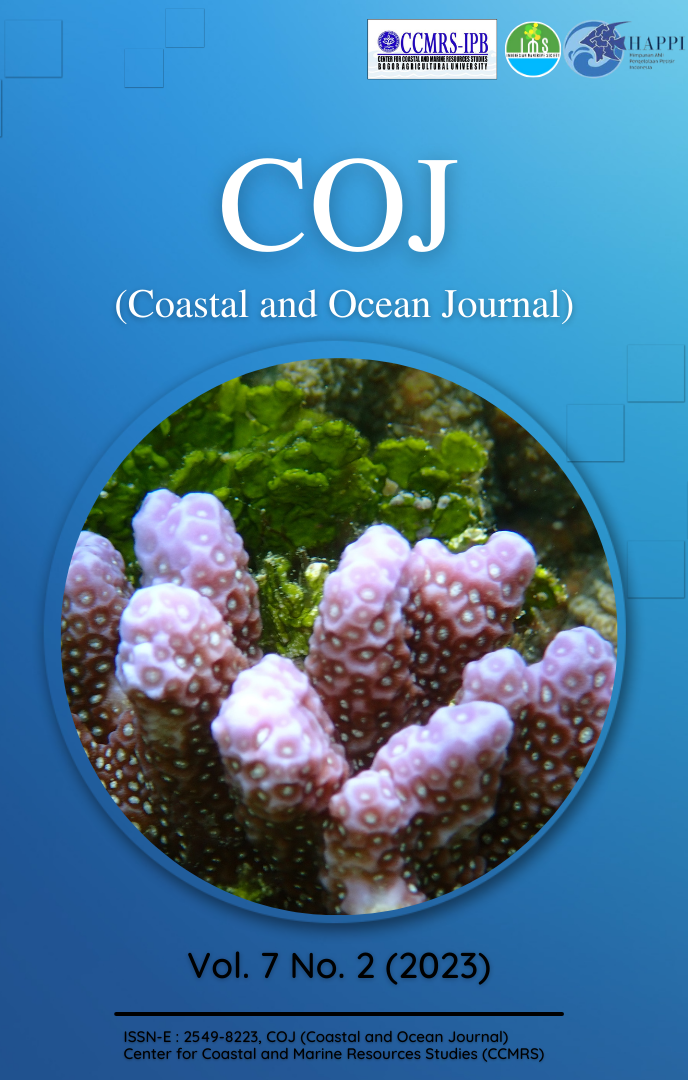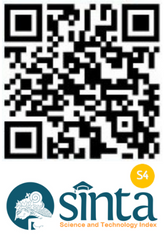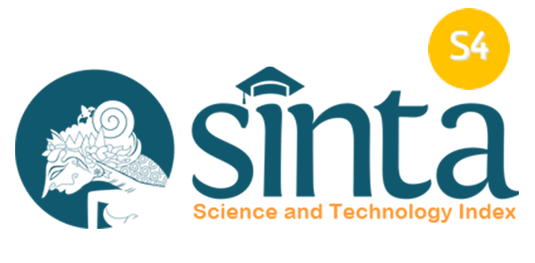ANALYSIS OF HUMAN ERROR IN OPERATING FISHING BOAT PROPULSION ENGINES IN BITUNG, NORTH SULAWESI
Abstract
The operation of ship propulsion engines is quite complex and requires adequate skills and expertise to operate the machinery. The occurrence of errors in operating the machinery is a possibility. The objective of this research is to analyze the occurrence of errors in operating ship propulsion engines caused by human error. To obtain valid results, observations of the crew while operating the machinery are conducted, and each task is broken down to obtain specific, detailed tasks through Hierarchical Task Analysis. Data generated using the Systematic Human Error Reduction and Prediction Approach (SHERPA) are comprehensively analyzed. The results reveal 21 specific tasks with criteria for inspection, action, and communication. Human errors occurred in profiles of low and moderate risk. Recommendations are provided to improve the risk profiles. The findings of this research have a significant impact on addressing the issues related to machinery operation caused by human errors.
Downloads
References
Abrori, M. Z. L., Sidhi, S. D. P., & Prasetyo, D. (2021). Modern Monitoring Instrument to Support Fishing Vessel Operation and Maintenance: A Review. International Journal on Advanced Science, Engineering and Information Technology, 11(6), 2305. https://doi.org/10.18517/ijaseit.11.6.15066
Abrori, Z. L. (2022). Identifikasi Intensitas Aktivitas Kerja Awak Kapal Purse seine di Perairan Selat Malaka Identification of Work Intensity Purse seine Fishing Vessels Crews Activities in Malaca Strait Waters Suci Asrina Ikhsan, Sri Yenica Roza, Ratih Purnama Sari, Roma Yuli F. Hutapea, M. Jurnal Airaha, 11(01).
Ajayi, S. O., Adegbenro, O. O., Alaka, H. A., Oyegoke, A. S., & Manu, P. A. (2021). Addressing behavioural safety concerns on Qatari Mega projects. Journal of Building Engineering, 41, 102398. https://doi.org/10.1016/j.jobe.2021.102398
Amin, M., Purwangka, F., & Mawardi, W. (2018). TINGKAT KETERAMPILAN DAN PENGETAHUAN NELAYAN DI KARANGANTU BANTEN. ALBACORE Jurnal Penelitian Perikanan Laut, 2(1), 107–121. https://doi.org/10.29244/core.2.1.107-121
Ashour, A., Phipps, D. L., & Ashcroft, D. M. (2022). Predicting dispensing errors in community pharmacies: An application of the Systematic Human Error Reduction and Prediction Approach (SHERPA). PLOS ONE, 17(1), e0261672. https://doi.org/10.1371/journal.pone.0261672
Azarnia Ghavam, M., Mazloumi, A., & Hosseini, M. R. (2019). Identification and evaluation of human error in operation of electrical installations of Tehran Province Electricity Distribution Company using SHERPA technique. Journal of Health and Safety at Work, 9(4), 363–380.
Basuki, M. A. W., Handoko, L., & Rachmat, A. N. (2017). Analisis Human Error pada Operator Harbour Mobile Crane untuk Pekerjaan Bongkar Muat dengan Metode SHERPA ( Studi Kasus : Perusahaan Bongkar Muat ). Proceeding 1st Conference on Safety Engineering and Its Application, 79–86.
Budiawan, W., & Iridiastadi, H. (2013). Perancangan Computer Aided System Dalam Menganalisa Human Error Di Perkeretaapian Indonesia. J@Ti Undip : Jurnal Teknik Industri, 8(2), 89–98. https://doi.org/10.12777/jati.8.2.89-89
Choi, J.-R., Han, H. J., & Ham, D.-H. (2021). Predicting Human Errors in Landing Situations of Aircraft by Using SHERPA. Journal of the Korean Society for Aviation and Aeronautics, 29(2), 14–24. https://doi.org/10.12985/ksaa.2021.29.2.014
Derdowski, L. A., & Mathisen, G. E. (2023). Psychosocial factors and safety in high-risk industries: A systematic literature review. Safety Science, 157, 105948. https://doi.org/10.1016/j.ssci.2022.105948
Dewangga, K., Emanuel, A. W. R., & Widhiyanti, K. (2022). Perancangan Gamifikasi Pada Proses Implementasi ERP Menggunakan Metode Accelerate SAP. Teknika, 11(3), 225–234. https://doi.org/10.34148/teknika.v11i3.552
Guspara, W. A., Satwikasanti, W. T., & Jiyan, L. (2018). Hierarchical Task Analysis dalam pengembangan gagasan produk. Productum: Jurnal Desain Produk (Pengetahuan Dan Perancangan Produk), 3(4), 133–140.
Hadi, S., Priharanto, & Latief. (2018). FAILURE MODE AND EFFECT ANALYSIS (FMEA) APPLIED FOR RISK ASSESSMENT OF FUEL OIL SYSTEM ON DIESEL ENGINE OF FISHING VESSEL. https://doi.org/10.5281/ZENODO.1884286
Inajati, E., & Utomo, E. P. (2019). PENGEMBANGAN PERPUSTAKAAN PERGURUAN TINGGI YANG BERORIENTASI PADA CIVITAS AKADEMIKA DAN PERKEMBANGAN TEKNOLOGI INFORMASI. Jurnal Pustaka Budaya, 6(2), 30–38. https://doi.org/10.31849/pb.v6i2.2206
Kusumanto, I. (2016). Usulan Perbaikan Sistem Kerja Pada Proses Produksi Crumb Rubber Menggunakan Metode SHERPA Di PT. Riau Crumb Rubber Factory. Jurnal Teknik Industri: Jurnal Hasil Penelitian Dan Karya Ilmiah Dalam Bidang Teknik Industri, 2(1), 62. https://doi.org/10.24014/jti.v2i1.5064
Navas de Maya, B., Komianos, A., Wood, B., de Wolff, L., Kurt, R. E., & Turan, O. (2022). A practical application of the Hierarchical Task Analysis (HTA) and Human Error Assessment and Reduction Technique (HEART) to identify the major errors with mitigating actions taken after fire detection onboard passenger vessels. Ocean Engineering, 253, 111339. https://doi.org/10.1016/j.oceaneng.2022.111339
Pramoda, R., Muliawan, I., Apriliani, T., Witomo, C. M., & Yulisti, M. (2021). Competency of fishing boat crew from Indonesia in the framework of standards of training, certification, and watchkeeping for fishing vessel personnel 1995 (STCW-F 1995). IOP Conference Series: Earth and Environmental Science, 860(1), 012088. https://doi.org/10.1088/1755-1315/860/1/012088
Priharanto, Y. E., Yaqin, R. I., Marjianto, G., Siahaan, J. P., & Abrori, M. Z. L. (2023). Risk Assessment of the Fishing Vessel Main Engine by Fuzzy-FMEA Approach. Journal of Failure Analysis and Prevention, 23(2), 822–836. https://doi.org/10.1007/s11668-023-01607-w
Punusigon, F. G., & Sitokdana, M. N. N. (2022). Analisis Manajemen Resiko Aplikasi Simfoni Pada Dinas Ppa Di Kab. Minahasa Tenggara Menggunakan Iso 31000. ZONAsi: Jurnal Sistem Informasi, 4(2), 25–36. https://doi.org/10.31849/zn.v4i2.10463
Purwanto, Y., Iskandar, B. H., Imron, M., & Wiryawan, B. (2016). ASPEK KESELAMATAN DITINJAU DARI STABILITAS KAPAL DAN REGULASI PADA KAPAL POLE AND LINE DI BITUNG, SULAWESI UTARA (Safety Aspects Pole and liner From Ship Stability and Regulation Point of View in Bitung, North Sulawesi). Marine Fisheries : Journal of Marine Fisheries Technology and Management, 5(2), 181–191. https://doi.org/10.29244/jmf.5.2.181-191
Rahmawati, J., Suroto, S., & Setyaningsih, Y. (2022). Apakah Unsafe Action dan Unsafe Condition Berpengaruh terhadap Kecelakaan Nelayan? Jurnal Keperawatan, 14(1), 301–312. https://doi.org/10.32583/keperawatan.v14i1.146
Rammadaniya, P., & Mahbubah, N. (2022). Integration of the HEART and SHERPA approach to evaluating human errors in the refinery salt production. Jurnal Sistem Teknik Industri, 24(2), 177–193.
Riandadari, U. (2019). Identifikasi Bahaya dengan Metode HIRARC dalam Upaya Memperkecil Risiko Kecelakaan Kerja di PT . PAL Indonesia. Jurnal Teknik Mesin UNESA, 08(01), 34–40.
Riyanti, T. D., Tambunan, W., & Sukmono, Y. (2021). Analisis Human Reliability Assessment (HRA) dengan Metode HEART dan SPAR-H (Studi Kasus PT.X). JOURNAL OF INDUSTRIAL AND MANUFACTURE ENGINEERING, 5(1), 41–48. https://doi.org/10.31289/jime.v5i1.4138
Santoso, P. N., Sullyartha, E. R., & Sihombing, L. M. (2022). Strategi Meminimalkan Error Pada Teknisi Maintenance Mesin 350F dengan Systematic Human Error Reduction and Prediction Approach (SHERPA) di PT. XYZ. Angkasa: Jurnal Ilmiah Bidang Teknologi, 14(2), 199–208. https://doi.org/10.28989/angkasa.v14i2.1360
Septiani, W., Adisuwiryo, S., Safitri, D. M., Suudi, B. C., & Utami, I. W. I. W. (2022). Pelatihan Pencegahan Human Error Untuk Peningkatan Produktivitas Kerja. Jurnal Pengabdian Mandiri, 1(7), 1223–1230.







